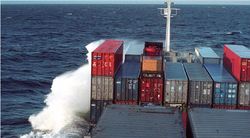Box carriers struggling to improve schedule reliability

Although the second quarter usually sees an improvement in on-time deliveries, this year’s performance is still the worst on record Service reliability picks up from dire first quarter but remains poor.
CONTAINER line schedule reliability remains at its lowest-yet level for the time of the year despite improving from its worst-ever figures during the first quarter of this year, according to analysis by SeaIntel. “Global average schedule reliability is still the lowest it has been in any second quarter, down 2.7 percentage points compared to the second quarter of last year, which was the previous lowest second-quarter score,” SeaIntel said.
Of the top-14 carriers, 13 recorded a quarterly improvement in schedule reliability, with Wan Hai the only carrier to record a quarterly decline, of 2.6 percentage points to 78%. Despite this, at 78% Wan Hai was the most reliable carrier in the second quarter of 2018, followed by APL, Evergreen and Maersk Line, with 77.7%, 77.5%, and 77.3% schedule reliability, respectively. “On the other hand, all three The Alliance carriers were the least reliable in the second quarter,” SeaIntel said. All three carrier alliances recorded considerable improvement in their schedule reliability, with Ocean Alliance the most reliable alliance, recording 81.7% schedule reliability in June 2018, followed by 2M with 75% and The Alliance with 66.2%. “Schedule reliability has traditionally picked up in the second quarter, but we have previously noted that this might not be the case this year, especially in the South American trades due to the extensive network restructuring with Maersk Line’s acquisition of Hamburg Süd,” SeaIntel said.
“In addition to that, we also noted that with ONE formally starting operations in April 2018, there were bound to be transitional hiccups and operational challenges which might affect schedule reliability of those services.” The Asia-Europe trade lane recorded an annual improvement in schedule reliability of 6.2 percentage points and Asia-Mediterranean a 3.4 percentage point gain, reaching 83.6% and 77.9% respectively.
But on the transpacific, schedule reliability to the US west and east coasts fell to 70.7% and 66.6%, down 7.6 and 7.9 percentage points respectively. Westbound transatlantic services recorded 65.4% schedule reliability in the second quarter, an annual decline of 3.3 percentage points, while eastbound schedule reliability fell one percentage point to 67.3%.